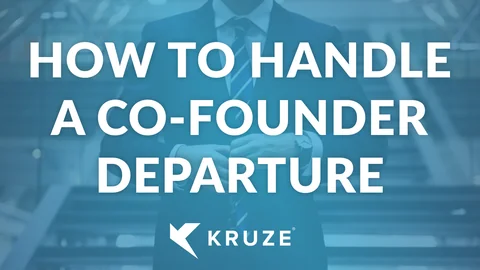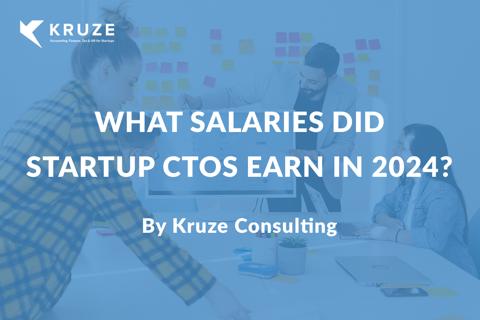
The relationship between co-founders at a startup is often a long-term, close working relationship that benefits the company. But like other relationships, sometimes a co-founding partnership doesn’t work out, and one founder decides to leave or even gets fired by the board. That can be traumatic, but it can also be a positive step.
Perhaps the co-founder isn’t aligned with the company’s current direction, or is burned out, or wants to pursue other interests. But if one of the partners’ or the founders’ hearts aren’t really in it, it’s better to know sooner than later. Parting ways may be the best thing for the startup’s future. However, just like with any other breakup, there are some steps the company should take to minimize the disruption of the co-founder’s departure.
Tips on handling a startup co-founder’s exit
One of the most important things you should work for is to handle a co-founder’s departure professionally and respectfully. Here are some considerations for startups when one of the founder leaves.
- Amicable departure vs. termination – Amicable departures are generally easier than terminations, but both require planning.
- Equity impact – Many founders have a vesting agreement and, if they’ve been with the company long enough, have significant stock.
- Stock buyback – Sometimes the board or venture capital firm will offer to buy back a departing co-founder’s vested stock.
- Severance documents – Review any existing severance agreements or negotiate appropriate severance, which may include intellectual property (IP) assignments, severance payments (if applicable), and non-disclosure agreements.
- Final paycheck – Pay any salary, paid time off (PTO), and outstanding expense reimbursements.
- Communication – Develop messaging to the employees, board, and investors, to announce the departure and provide reassurance.
What Happens When a Founder Leaves a Company
Let’s dig into the details on what happens when a founder leaves a startup:
Amicable departures vs. termination
If the parting is agreeable to everyone, the separation is a lot easier. Ideally, you can work together to make a smooth transition. If it’s a termination, there are other considerations, because you need that person to leave immediately. You’ll need to move more quickly, working with your human resources department, document the reasons for the termination, and have a meeting with the employee. Both types of separation require careful communication with employees, board members, and other stakeholders.
Equity impact
Dealing with the stock issues created when a co-founder leaves can be challenging. When the startup is launched, all the founders should be put on a vesting schedule. A vesting schedule specifies when founders receive their stock, and allows those who stay longer to collect more equity than founders who leave earlier. There’s often a first year cliff where a portion of the stock vests, and then more is vested monthly over four or five years. Founders do not typically pay cash for stock – it’s part of their compensation for their work on the startup. So their stock doesn’t have a strike or exercise price like stock options granted to non-founding employees do.
A vesting schedule achieves several goals:
- Vesting protects founders who stay with the startup from the “free rider” issue, where a departing founder can still participate in the company’s success even though he or she isn’t helping build the company.
- Adopting a vesting schedule when the company is formed generally prevents later investors from insisting on vesting restrictions. Many VC investors want to see vesting agreements in place, and if one doesn’t exist they may require it.
- A vesting agreement also ensures that if founders leave early, they will not get so much stock that the company can’t provide adequate equity compensation for anyone hired to replace them.
The company will retain any equity that’s not vested. However, if the startup has been in existence for a few years, the departing founder may own a significant amount of stock. In those cases, the board or venture capital firm may offer to purchase some or all of the stock back.
Stock buyback
This is not mandatory and doesn’t always happen, but sometimes a venture capital firm or the board of directors will offer to buy out the co-founder’s vested stock. In those cases, the departing founder gets a check immediately, and they can move on. The VC firm improves their equity commitment to the company, and now they don’t have to worry about a significant chunk of the company being owned by a former founder who may not be supportive. Note: If you are a departing founder with a buyout offer of any type, consult your attorney. A company buyback could negate your ability to claim your stock as a qualified small business stock (QSBS), which will significantly impact your tax liability.
Severance documents
It’s a good Idea to create a legal severance agreement that protects the company’s interests as well as those of the departing founder. Many times these documents are created and signed when the company is founded, but can also be negotiated when a founder departs. The severance agreement can outline the compensation terms. The agreement should also include an assignment of intellectual property (IP) rights. That protects the company from a founder leaving, claiming rights to the IP, and starting a competing company. Particularly during terminations, you may offer financial compensation as part of the severance agreement, and typically you will ask for a non-disclosure agreement, and may include language to protect the company from litigation in exchange for a cash payment.
Final paycheck
It seems like a small detail, but it’s very important, especially during a termination. The departing co-founder should get a final paycheck, and be paid for any other benefits, like accumulated paid time off (PTO). Failure to do so can open the company up for a lawsuit.
Communication
Once you know a co-founder will be leaving your startup, you need to communicate that information to the employees, your investors, and your board of directors. Departures like this can be upsetting, so you should create a plan to carefully communicate this information, both to keep any turmoil to a minimum and build trust and confidence among your stakeholders.
What happens when a co-founder leaves?
When a co-founder leaves, you’ll want to make sure you are following the local employment regulations around the last paycheck for the founder. Unvested founder shares essentially revert to the company’s ownership – in effect, boosting all other equity holder’s ownership percentages. The company may have the opportunity to purchase the vested shares; otherwise, the business will have a person who is no longer working in the business owning a decent amount of the company. Make sure to handle the severance agreement cleanly – hiring a good attorney to help with this is a very good idea.
Handling a co-founder departure correctly
Having a co-founder leave can be a loss for a startup, but it’s not necessarily a catastrophe. One final piece of advice that we recommend is to always take the high road. You don’t need to share the details of an acrimonious departure. End the business relationship using a respectful, legal, fair, and transparent process, and then work on continue to build a successful startup. If you have more questions about startup accounting or management, please contact us.















